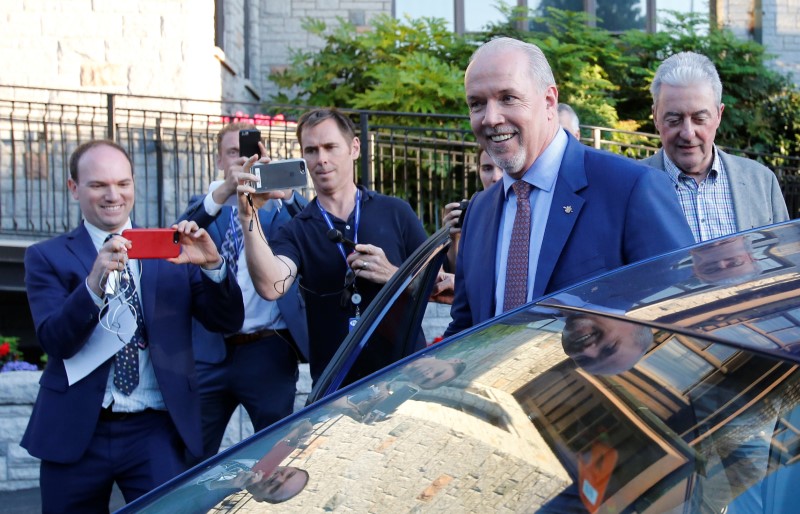By Kevin Light
VICTORIA, British Columbia (Reuters) - British Columbia's Liberal government was defeated on Thursday in a non-confidence vote, as expected, paving the way for the left-leaning New Democrats to rule the Western Canadian province for the first time in 16 years.
Such a prospect has unnerved investors in Canada's third-most populous province, not least owners of oil and gas projects such as Kinder Morgan (NYSE:KMI) Inc's C$7.4 billion Trans Mountain pipeline expansion, which the New Democratic Party (NDP) has vowed to halt.
But an NDP government, which has to be propped up by the third-place Green Party to achieve a slim parliamentary majority of one, is fragile, and few expect it to survive the four-year term.
On Thursday, seven weeks after a knife-edge election, NDP and Green lawmakers used their 44 votes in the 87-member legislature to pass a non-confidence amendment to the Liberal government's Throne Speech.
After the vote, NDP leader John Horgan told reporters he had met the province's nominal head, Lieutenant-Governor Judith Guichon, and that she had invited him to form a new government, making him British Columbia's next premier.
"We'll have access to government documents tomorrow to start working on a transition," Horgan said. "I can't predict when that (transition) will be, but it's going to be soon."
Incumbent Premier Christy Clark told media she offered her resignation to Guichon, but asked for a dissolution of the legislature, which the lieutenant-governor did not grant.
Dissolution would trigger another election. While Guichon technically has that power, such a move would go against convention for the largely ceremonial leader.
Guichon said in a statement she will accept Clark's resignation.
The NDP and Greens struck an agreement last month to oust the right-leaning Liberals - unaffiliated with the left-leaning Liberals in power federally - after a May 9 election reduced Clark's party to a minority.
The NDP and Greens, which will form the province's first minority government in 65 years, have accused the Liberals of trying to retain power after the election by stealing their election promises and introducing them as last-minute legislation to delay being voted out.
Yet those same promises could be hard to deliver under an NDP government, which needs Green cooperation and every legislator to be present for every vote to pass laws, said University of British Columbia political science professor Hamish Telford.

"The NDP may decide on its own accord that it needs to have a fresh election," he said.